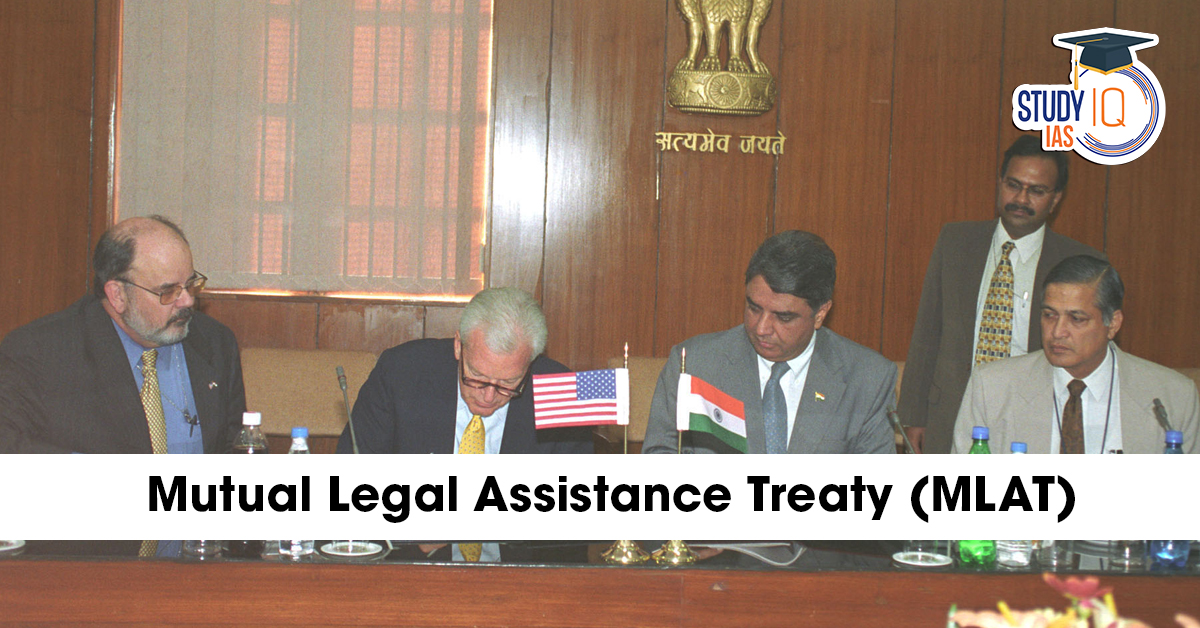Table of Contents
The Mutual Legal Assistance Treaty (MLAT) has gained renewed attention after the Government of India formally invoked it with Singapore to investigate the mysterious death of singer Zubeen Garg. MLAT plays a crucial role in facilitating international cooperation in criminal investigations, prosecutions, and the prevention of cross-border crimes.
In an era where crimes easily transcend national boundaries—such as cybercrime, money laundering, terrorism, and corruption—MLAT serves as an essential legal tool for global justice.
What is the Mutual Legal Assistance Treaty (MLAT)?
The Mutual Legal Assistance Treaty (MLAT) is a bilateral or multilateral agreement between two or more countries that allows them to exchange information, evidence, and other legal assistance in connection with criminal investigations and proceedings.
MLATs ensure that law enforcement and judicial authorities in one country can request help from another country in gathering evidence, tracing proceeds of crime, serving legal documents, and extraditing offenders.
Objectives of MLAT
The main objectives of MLAT include:
-
Facilitating effective investigation and prosecution of transnational crimes.
-
Ensuring timely exchange of information and evidence between countries.
-
Preventing criminals from evading justice by crossing borders.
-
Enhancing international cooperation in combating organized and serious crimes.
Key Features of MLAT
1. Scope of the Treaty
MLAT covers a wide range of offences including:
-
Terrorism
-
Organized crime
-
Drug trafficking
-
Money laundering
-
Cybercrime
-
Corruption
-
Financial fraud and other serious crimes
2. Forms of Assistance under MLAT
Countries that are part of the treaty can provide assistance in several forms, such as:
-
Identifying and locating persons involved in a case
-
Serving legal documents, such as summons or warrants
-
Obtaining witness statements or testimonies
-
Executing search and seizure operations
-
Freezing, confiscating, or repatriating proceeds of crime
-
Sharing certified documents and evidence
These measures strengthen cross-border legal cooperation and help bring offenders to justice, even when they are located abroad.
MLAT Framework in India
In India, the Ministry of Home Affairs (MHA) is the nodal authority responsible for handling requests under MLATs. All incoming and outgoing requests related to international criminal investigations are processed through the MHA to ensure legality and adherence to international norms.
India has signed MLATs with over 40 countries, including:
-
Singapore
-
United States of America (USA)
-
United Kingdom (UK)
-
France
-
Russia
-
United Arab Emirates (UAE) and others.
Legal Provisions under Indian Law (CrPC, Chapter VIII)
The Code of Criminal Procedure (CrPC) provides the legal basis for implementing MLAT in India through Sections 108 to 111:
| Section | Description |
|---|---|
| Section 108 | Sending a letter of request to a foreign country for obtaining evidence or assistance in an investigation. |
| Section 109 | Acting on a letter of request received from a foreign country for gathering evidence within India. |
| Section 110 | Service of summons and judicial documents abroad for witnesses or accused persons. |
| Section 111 | Examination of witnesses or collection of evidence in a foreign country through authorized channels. |
Importance of MLAT for India
-
Strengthens international cooperation against cross-border crimes.
-
Speeds up investigations involving foreign elements or evidence located abroad.
-
Helps recover black money and track assets hidden in foreign jurisdictions.
-
Supports extradition processes and prosecution of absconding offenders.
-
Enhances India’s global credibility in upholding rule of law and international justice.
Recent Context: MLAT with Singapore in Zubeen Garg Case
The invocation of MLAT with Singapore in the Zubeen Garg death investigation highlights India’s growing reliance on international legal cooperation. Through MLAT, Indian authorities can request Singaporean counterparts to provide critical evidence, surveillance data, or witness testimonies to ensure a fair and transparent investigation.
Conclusion
The Mutual Legal Assistance Treaty (MLAT) represents a cornerstone of international criminal justice. By enabling countries to exchange information and evidence seamlessly, it helps bridge jurisdictional gaps and ensures that offenders cannot escape accountability simply by crossing borders.
With India actively invoking MLATs in major international cases, the framework continues to evolve as a key pillar of global cooperation against crime.


 Tiniest QR Code: Scientists Develop Ultr...
Tiniest QR Code: Scientists Develop Ultr...
 Rupture Across the Durand Line: Rising T...
Rupture Across the Durand Line: Rising T...
 Why Berbera Port Matters: Israel’s Rec...
Why Berbera Port Matters: Israel’s Rec...




















